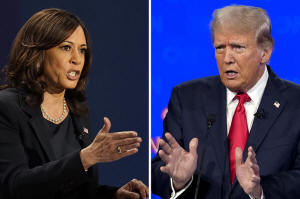Abortion has passed inflation as the top election issue for women under
30, survey finds
 Send a link to a friend
Send a link to a friend
 [October 12, 2024]
By GEOFF MULVIHILL [October 12, 2024]
By GEOFF MULVIHILL
Abortion has passed inflation to become the top issue in the
presidential election for women younger than 30 since Vice President
Kamala Harris replaced President Joe Biden at the top of the Democratic
ticket, according to results released Friday of a survey of female
voters by KFF.
About 2 in 5 in the group of young voters said abortion was their top
concern in the recent survey, compared with 1 in 5 who ranked it most
important in the same survey in the spring.
In the earlier edition, inflation was the top concern for younger
voters, as it was for women voters of all ages. Inflation remained the
top concern for women in each age group over 30 and for women overall.
Women overall ranked abortion as their No. 3 concern, after inflation
and threats to democracy, but ahead of immigration.
KFF, a health policy research, polling and news organization, surveyed
678 female voters Sept. 12 through Oct. 1. Most of them were
participants in an earlier wave of the same poll, conducted in May and
June. The follow-up survey group was supplemented with 29 Black women to
ensure an adequate sample size of that group. The sampling error was
plus or minus 5 points, with larger ranges for subgroups of voters.

Abortion has long been a major issue, but the landscape shifted in 2022
when the U.S. Supreme Court, powered by three justices nominated by
Harris' current opponent, former President Donald Trump, overturned Roe
v. Wade and opened the door for states to impose abortion bans.
Most Republican-controlled states are now enforcing such bans, including
13 that bar abortions at all stages of pregnancy, with some exceptions,
and four with bans that kick in after about the first six weeks of
pregnancy — before women often realize they're pregnant.
Harris has been making abortion access a centerpiece of her campaign.
Younger women who responded to the survey and spoke with The Associated
Press on Friday have noticed.
Ally Zobel, 19, who describes herself as a left-leaning independent and
lives in Woodbridge, Virginia, said that reproductive health is the most
important issue for her as she prepares to vote for the first time — and
that she appreciates Harris’ calls to restore abortion rights
nationally.
She said that she’s concerned about stories of women having health
emergencies because they can’t obtain an abortion — and that
“pregnancy’s really hard” and that people should not be forced to
continue if if they don’t want to.
“As a mom, I don’t want my kids growing up in a world where it’s like
that,” she said.
Sydney Wright, a 29-year-old stay-at home mom in Effingham County,
Illinois, said Roe v. Wade being overturned propelled the restoration of
abortion rights to the top of her list of concerns. And while she's not
thrilled with everything about Harris, the Democrat's abortion position
is one of the main reasons Wright plans to vote for her.
[to top of second column]
|

In this combination image, Democratic vice presidential candidate
Sen. Kamala Harris, D-Calif., speaks during a debate, Oct. 7, 2020,
in Salt Lake City, left, and Republican presidential candidate
former President Donald Trump speaks during a debate, June 27, 2024,
in Atlanta. (AP Photo/File)
 “I’ve seen people have to travel out
of state and come to Illinois for health care,” said Wright, who is
not registered with a political party. “I’ve heard of cases where
doctors were forced to leave patients to suffer until they were
practically dead until they could give them medical care.”
In addition to the presidential race, a number of other elections
this year could impact the abortion landscape, including in nine
states where there are ballot measures that would protect the right
to abortion in the state constitution.
Races for Congress — as well as state offices such as governor,
legislators, state supreme court justices and attorneys general —
could also help determine abortion policy moving ahead.
Overall, about two-thirds of women said the election will have a
major impact on abortion access, up from just over half in the
initial survey.
Most women said it is likely Trump would sign a federal law banning
abortions after the first 15 weeks of pregnancy if Congress were to
pass such a measure. Just as the survey period ended, Trump said he
would veto an abortion ban if one reached his desk.
The majority said they believe Harris would sign a law protecting
access to abortion nationwide if Congress were to pass that.
There's a deep partisan split over which candidate would be better
on abortion access. Most women said they preferred Harris, including
90% of Democrats and fewer than one-fifth of Republicans. The survey
found similar dividing lines around which candidate would be better
for birth control access and in vitro fertilization.
The survey found that Republican women are slightly less hopeful and
enthusiastic, and more anxious and frustrated, about the
presidential election than they were earlier this year. By contrast,
Democratic women are far more hopeful and enthusiastic, though their
anxiousness has also risen.
Like in the spring, a little over half of GOP women are satisfied
with their presidential choices. But satisfaction among Democratic
women shot up from just over one-third to three-quarters.
All contents © copyright 2024 Associated Press. All rights reserved
 |